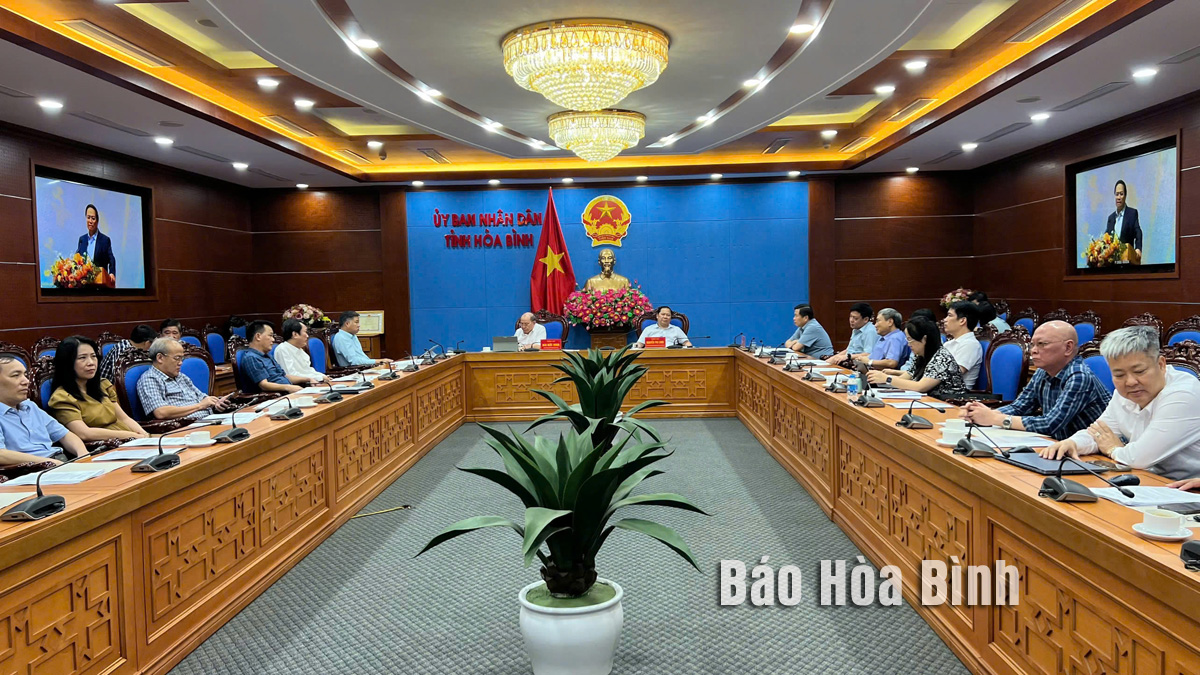


Attending the event from Hoa Binh were Nguyen Phi Long, alternate member of the Party Central Committee, Secretary of the provincial Party Committee; Bui Duc Hinh, Deputy Secretary of the provincial Party Committee, Chairman of the provincial People’s Committee; along with other leaders of the provincial People’s Committee and several departments and sectors.

Provincial leaders attend the national teleconference from Hoa Binh.
The results achieved in implementing these programmes and movements over the past five years affirm the sound policies of the Party and State, which have received strong public support and helped promote the development of ecological agriculture, modern rural areas, and a cultured farming community. Accordingly, 6,084 out of 7,669 communes nationwide, equivalent to 79.3%, have met the new-style rural standards; 2,567 communes, or 42.2%, have met advanced new-style rural standards; and 743 communes, or 12.2%, have achieved exemplary new-style rural status.
In addition, 329 out of 646 district-level units, equal to 51%, across 60 provinces and centrally-run cities have been recognised by the Prime Minister as having completed or met the new-style rural standards; 48 districts have achieved advanced new-style rural status; and 12 provinces have been recognised by the PM as having completed the task of building new-style rural areas.
By the end of 2024, the national household poverty rate had dropped to 1.93%, down 3.27% from the end of 2022. The average per capita income of rural residents is approximately 54 million VND (2,060 USD) a year.
In Hoa Binh, the national target programmes on building new-style rural areas and the "the whole nation joins hands to build new-style rural areas” movement for the 2021–2025 period have been carried out drastically, regularly, consistently, and effectively, leading to many important results. The rural landscape and the living standards of the people have significantly improved; infrastructure has been invested in and upgraded; and the quality of education, healthcare, and public health services has been enhanced. By the end of the second quarter of 2025, the province is expected to have 83 out of 129 communes meeting new-style rural standards, equivalent to 98.8% of the target set by the government. Luong Son and Lac Thuy districts, and Hoa Binh city have all been recognised as meeting the new-style rural standards.
Regarding the national target programme on sustainable poverty reduction and the "for the poor - leaving no one behind” movement, the province has developed feasible investment policies tailored to the socio-economic conditions of different regions and localities. From 2021 to 2024, the province’s poverty rate dropped from 15.49% to 6.59%, with a target of reducing it further to 5.31% by 2025. All poor and near-poor households have had access to preferential policies in healthcare, education, housing, credit, and vocational training.
Concluding the teleconference, PM Chinh urged ministries, sectors, and localities to refine mechanisms to serve the principle that farmers are the centre and main actors, agriculture is the driving force, and rural areas are the foundation of development. He laid stress on the significance of building strategic infrastructure for agriculture, encompassing both hard and soft facilities, in a green and sustainable manner.
Human resources development represents another critical focus in the new development phase, and should be aligned with the two-level local administration model and the four strategic pillars. The final priority involves diversifying agricultural products to meet both domestic Vietnamese and global consumption demands, diversifying supply chains, and expanding markets, he said.
On this occasion, three collectives from Hoa Binh province were awarded certificates of merit by the Ministry of Agriculture and Environment for their outstanding achievements in the emulation movement of joining hands to build new-style rural areas during the 2021–2024 period. Additionally, 10 collectives, 19 individuals, and one household received certificates of merit from the Chairman of the provincial People’s Committee for their excellent performance in the "for the poor - leaving no one behind” movement.